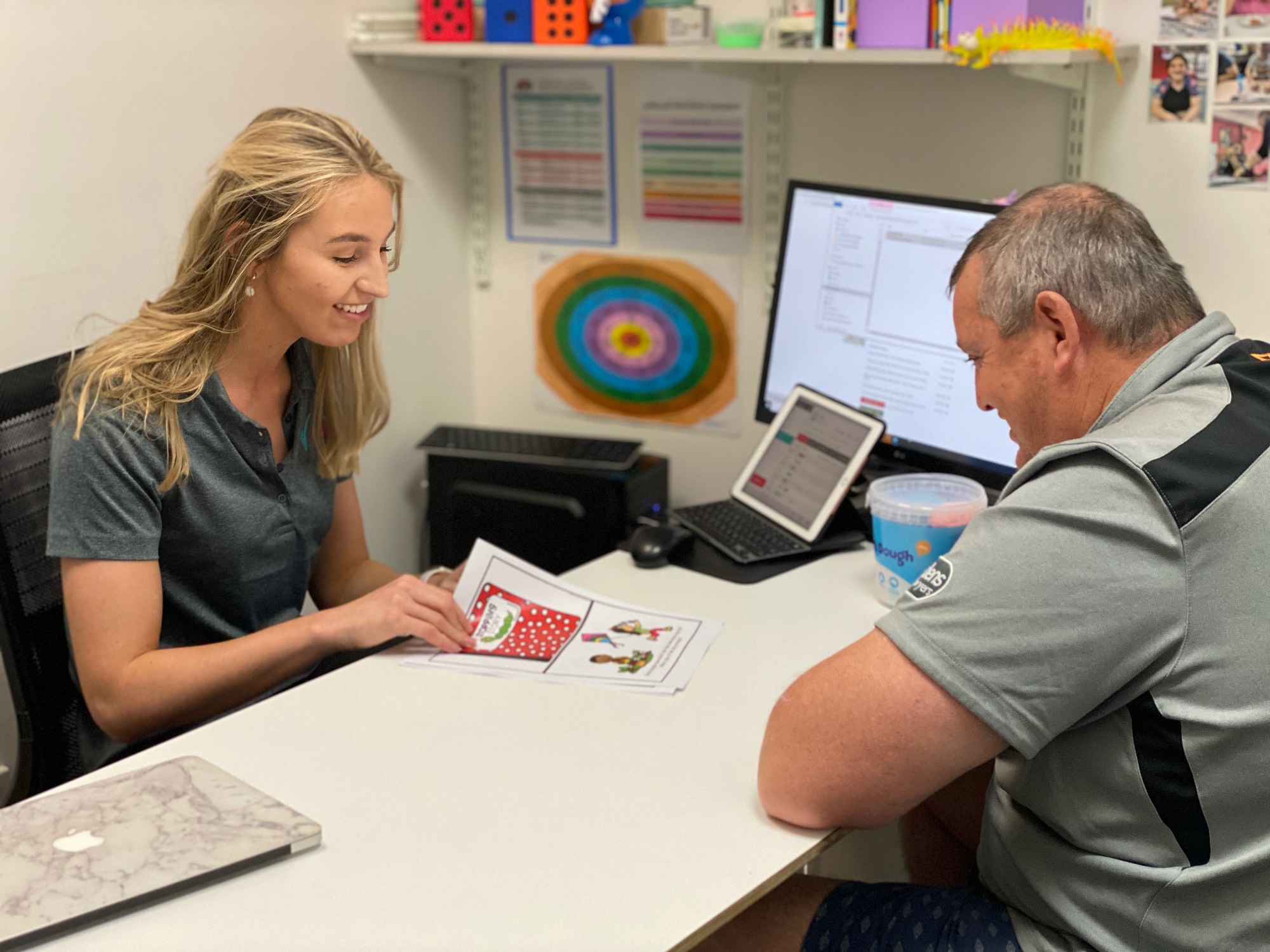
This week (22-28 August) is Speech Pathology Week. This year’s theme is: Communication is everyone’s right.
The coronavirus (COVID-19) pandemic has unfortunately highlighted the challenges faced by those with communication disability. We’ve seen this firsthand and it has deepened our commitment to supporting participants via telehealth sessions, so that the communication skills they’ve developed aren’t hindered.
Communication is a basic human right and Speech Pathology Week seeks to make Australians aware of this.
Speech pathologists, including Therapy Care’s Kira, work to ensure everyone can communicate with confidence.
Kira believes, “confident communication helps maximise educational, health and social outcomes.”
“To really empower a person to communicate, you need to support them with building all forms of communication that isn’t just limited to speech,” says Kira.
As mentioned, lockdown has been a challenging time for those with communication disabilities. However, there are many who have taken this challenge in their stride, and we’re thrilled to share their recent wins.
Jason Keir
Jason lives with Autism Spectrum Disorder. Under the NDIS, Jason receives speech pathology, exercise physiology and daily living support services through Therapy Care.
During lockdown Jason has been participating in weekly half hour speech sessions via telehealth. At the moment, Kira is working on building his social communication skills. This means working on things like extending conversations, problem solving and finding avenues where he feels confident expressing his emotions. Jason commented that he is looking forward to getting back to doing his sessions face-to-face and that he misses seeing everyone when he visits the Therapy Care Centre.
Kira says, “Jason’s attitude has been awesome during lockdown. He is always open to giving new activities a go! In his speech sessions, we practise scenarios that might come up at school, and give Jason the problem-solving tools and strategies to manage the scenario as well as his emotions.”
Kira explains, “By talking about situations that might cause frustration we normalise feeling frustrated. We then take this a step further and create a framework for addressing these issues.
“The process we’re working on is practising steps before reacting. These steps include taking a breath, identifying the problem, deciding on whether it is a big or small problem and then working out some possible ways to address the problem. Having this framework can help a participant stay calm and empowered enough to act out the steps when life’s unexpected problems arise.”
Armand Mahomudally
Armand lives with Autism Spectrum Disorder. Under the NDIS, Armand receives speech pathology, physiotherapy, exercise therapy and daily living support services via Therapy Care.
During lockdown, Armand has been consistently turning up to his weekly telehealth speech sessions. Armand is currently isolating with his mother and has not left the home in several weeks. Despite his current circumstance, Armand is motivated to improve his speech skills. When asked the other day what Armand is good, he replied: “I am good at improving my speech in therapy.” We couldn’t agree more Armand!
Recently Armand has been working on understanding non-literal language including sayings, phrases and idioms.
Kira explains, “Some individuals with Autism Spectrum Disorder, reading difficulties, language disorders, or individuals who learn English as a second language can have trouble understanding these types of sayings.”
Kira continues, “This can lead to misunderstandings when talking with others as individuals are exposed to this type of figurative language frequently through books, TV, news, social media etc. Armand was over the moon the other day when he said to me “it is raining cats and dogs outside.”!”
Simon Davis*
Simon lives with Down Syndrome. Under the National Insurance Disability Scheme (NDIS) Simon receives speech pathology and daily living support via Therapy Care.
Like many of us, adjusting to lockdown took Simon some time. Initially, he was withdrawn and spent most of his day in his. In an attempt to increase Simon’s ability to communicate and his engagement levels, Therapy Care organised a communication device for Simon. With this new found and accessible communication method, Simon started engaging with family members – asking proactive questions and initiating interactions. Now, it’s common for Simon to ask his parents: “what are you doing?” and “what’s for dinner?”, on a daily basis. Simon also uses his communication device to narrate his current and future activity, such as: “I am going downstairs.”
Kira says, “We’ve seen an incredible increase in Simon’s spontaneous communication. He is learning the flexibility of language to not only get what he needs but to connect with others.
“This is a powerful tool in developing language skills as Simon is learning and practicing the variety of ways we can communicate and the internal reinforcement this provides.”
We’re so proud of so many of our participants defying the odds and remaining unshakable in uncertain times. It’s really great to see that despite the obstacles of receiving support virtually, many members of the Therapy Care community are still receiving support that improves their skills and confidence.
To learn more about speech pathology, get in touch with us at info@therapycare.com.au. Alternatively, you can find out more about speech pathology under the NDIS, in our recent blog post ‘Accessing Speech Pathology under the NDIS‘
Simon Davis is not the real name of this participant. This participant has chose to remain anonymous.
